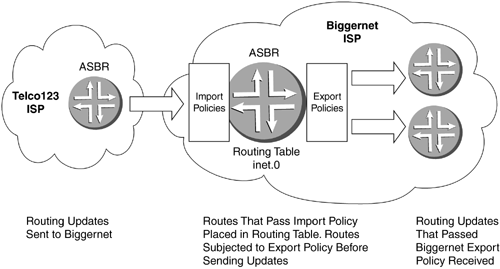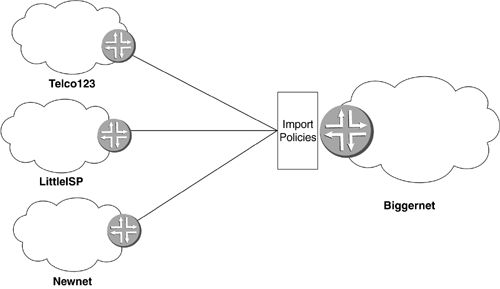11.1 Routing Policy Overview
| Routing policy can be described as a set of rules governing the interaction of protocols and the way in which routes are exchanged on a router. It could be said that it is protocol for protocols, if you will excuse the pun. Routing policy is one of the most important areas of a router's configuration, especially when it comes to defining external peering relationships with other routers at an interautonomous system level. There are many reasons to implement a set of rules in the form of a routing policy. Primarily, policy is necessary to control the following:
Hence, there are two types of routing policies that reflect control over incoming and outgoing routing information:
Figure 11-1 illustrates these policies. INET's router receives routes from Telco123's autonomous system boundary router, but before the routes are put in the routing table, they are passed through whatever input policies have been configured on INET's autonomous system boundary router. Figure 11-1. Import and Export Policies Note Routing policy is defined on a per-AS basis as much as on a per-router basis. Although there may be differing configurations on different routers in an AS, they work together to express an AS's routing policy. The routes that pass through the input policies are then stored in the inbound routing table of INET's router. This inbound table is normally referred to as adj-rib-in . On the outgoing side of INET's autonomous system boundary router, the router peers with two more routers within the INET network. The routes that get passed to these ISPs are first subjected to whatever export policies have been configured on INET's router. This outbound routing table that passes the export policy is commonly referred to as adj-rib-out . A routing policy is also an important way of enforcing a contractual agreement between an ISP and a customer or between a smaller and a larger ISP. As illustrated in Figure 11-2, we can see that there are several smaller companies attached to the INET AS. Each one of these companies will likely have different routing requirements, and therefore, a different policy must be applied to each. Figure 11-2. Policy Applied to Routes Coming into a Large ISP from Smaller ISPs Policies can be used to establish a list of trusted systems that you will allow updates from. They give a high degree of control over what information is passed to and from a router's routing tables, and they serve in an administrative capacity where route parameters, such as metric and preference, can be modified. For example, in Juniper Networks M-Series routers, regular expressions and BGP route flap damping (both of which will be covered in this chapter) are implemented in JUNOS through routing policies. Tools such as these assist a network engineer in providing optimum stability in a network and ensure that the routing information passing between routers is expressly permitted. This is where policy comes into its own as a policing tool. To ensure that policies can be applied on routers from different manufacturers, RPSL was created. Operators use this language to share knowledge with other engineers about what policies are applied to each other. The following section examines RPSL in more detail. |
EAN: 2147483647
Pages: 176

